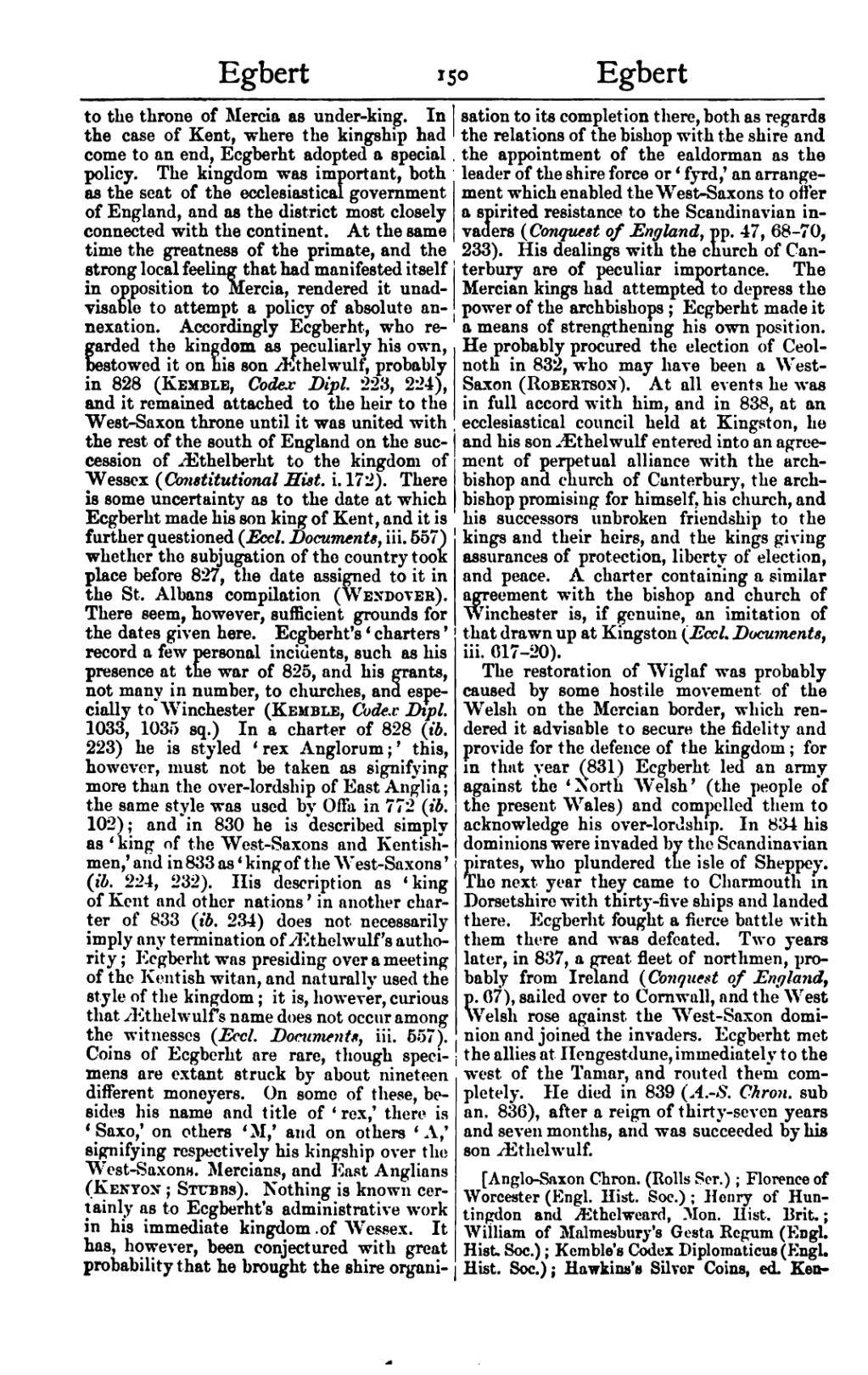Egbert to the throne of Mercia as under-king. In the case of Kent, where the kingship had come to an end, Ecgberht adopted a special policy. The kingdom was important, both as the seat of the ecclesiastical government of England, and as the district most closely connected with the continent. At the same time the greatness of the primate, and the strong local feeling that had manifested itself in opposition to Mercia, rendered it unadvisable to attempt a policy of absolute annexation. Accordingly Ecgberht, who regarded the kingdom as peculiarly his own. Bestowed it on his son Æthelwulf, probably in 828 (Kemble, Codex Dipl. 223, 224), and it remained attached to the heir to the West-Saxon throne until it was united with the rest of the south of England on the succession of Æthelberht to the kingdom of Wessex (Comstitutional Hist. i. 172). There is some uncertainty as to the date at which Ecgberht made his son king of Kent, and it is further questioned (Eccl. Documents, iii. 557) whether the subjugation of the country took place before 827, the date assigned to it in the St. Albans compilation (Wendover). There seem, however, sufficient grounds for the dates given here. Ecgberht's 'charters' record a few personal incidents, such as his presence at the war of 825, and his grants, not many in number, to churches, and especially to Winchester (Kemble, Codex Dipl. 1033, 1035 sq.) In a charter of 828 (ib, 223) he is styled 'rex Anglorum;' this, however, must not be taken as signifying more than the over-lordship of East Anglia; the same style was used by Offa in 772 (ib, 102); and in 830 he is described simply as 'king of the West-Saxons and Kentishmen,' and in 833 as 'king of the West-Saxons' (ib. 224, 232). His description as 'king of Kent and other nations' in another charter of 833 (ib, 234) does not necessarily imply any termination of Æthelwulf 's authority; Ecgberht was presiding over a meeting of the Kentish witan, and naturally used the style of the kingdom; it is, however, curious that Æthelwulf's name does not occur among the witnesses (Eccl. Doctinients, iii. 557). Coins of Ecgberht are rare, though specimens are extant struck by about nineteen different moneyers. On some of these, besides his name and title of 'rex,' there is 'Saxo,' on others 'M,' and on others 'A,' signifying respectively his kingship over the West-Saxons, Mercians, and East Anglians (Kenyon;Stubbs). Nothing is known certainly as to Ecgberht's administrative work in his immediate kingdom of Wessex. It has, however, been conjectured with great probability that he brought the shire organisation to its completion there, both as regards the relations of the bishop with the shire and the appointment of the ealdorman as the leader of the shire force or 'fyrd,' an arrangement which enabled the West-Saxons to offer a spirited resistance to the Scandinavian invaders (Conquest of England, pp. 47, 68-70, 233). His dealings with the church of Canterbury are of peculiar importance. The Mercian kings had attempted to depress the power of the archbishops; Ecgberht made it a means of strengthening his own position. He probably procured the election of Ceolnoth in 832, who may have been a West-Saxon (Robertson). At all events he was in full accord with him, and in 838, at an ecclesiastical council held at Kingston, he and his son Æthelwulf entered into an agreement of perpetual alliance with the archbishop and church of Canterbury, the archbishop promising for himself, his church, and his successors unbroken friendship to the kings and their heirs, and the kings giving assurances of protection, liberty of election, and peace. A charter containing a similar agreement with the bishop and church of Winchester is, if genuine, an imitation of that drawn up at Kingston (Eccl. Documents, iii. 617-20).
The restoration of Wiglaf was probably caused by some hostile movement of the Welsh on the Mercian border, which rendered it advisable to secure the fidelity and provide for the defence of the kingdom; for in that year (831) Ecgberht led an army against the 'North Welsh' (the people of the present Wales) and compelled them to acknowledge his over-lordship. In 834 his dominions were invaded by the Scandinavian pirates, who plundered the isle of Sheppey. The next year they came to Charmouth in Dorsetshire with thirty-five ships and landed there. Ecgberht fought a fierce battle with them there and was defeated. Two years later, in 837, a great fleet of northmen, probably from Ireland (Conquest of England, p. 67), sailed over to Cornwall, and the West Welsh rose against the West-Saxon dominion and joined the invaders. Ecgberht met the allies at Hengestdune, immediately to the west of the Tamar, and routed them completely. He died in 839 (A.-S.Chron, sub an. 836), after a reign of thirty-seven years and seven months, and was succeeded by his son Æthelwulf.
